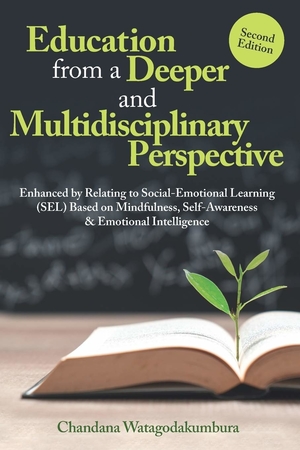
Most people believe that a strong education provides a foundation for the future, but there are also those who believe our educational philosophy in the 21st century is outdated and limiting, if not downright harmful to coming generations. In Education from a Deeper and Multidisciplinary Perspective, author Chandana Watagodakumbura presents a bold new vision for the future of education, an individualized and customized approach that could alter communities, populations, entrenched infrastructures, and global society as a whole.
Rather than arguing over the merits of the current educational system, or presenting small adjustments to improve standardized test scores, this book delves into the true nature of failing educational systems around the world. It deconstructs human brain development, juxtaposing that with the dynamic environment of the present tech-heavy era, suggesting that our old methods simply can’t keep up, nor should they be expected to. By altering the way we approach every single student, and promoting an educational process that can last a lifetime, rather than a handful of years during childhood, major changes to personal happiness and large-scale advancement could be achieved.
Watagodakumbura’s book is comprehensive in its analysis of how things are currently done, and what alternatives are out there, namely the idea of “authentic learning,” in which individuals are assessed through psychological, emotional, neurological, and human developmental angles. Teaching from multidisciplinary perspectives is a large part of authentic learning, a change that would require huge amounts of capital and support to break down current systems and establish radically different ones, without compromising the quality of education being delivered concurrently for the present generation.
Covering everything from Myers-Briggs personality tests and philosophical differences concerning knowledge retention to the arguments for accepting neurodiversity and the prevalence of ADHD in modern times, this is a dense read, but also one that is clearly laid out in terms of leading arguments, and firmly backed up with frequent reference material. For those who are interested in human development and educational philosophy, this could be an extremely enlightening read, but it does read more like an academic paper than an inspiring manifesto for change.
The ideas proposed in the book are more extreme than most views currently being offered for the paradigm of education, but the patient and meticulous nature of this author provides him with a strong sense of authority. While reading this book, the need for change in our educational systems does not only become clear, but a path forward towards a more productive future also feels somehow within reach.
On the technical side of the writing, however, a thorough line edit for readability, word choice, grammar and repetition is definitely warranted, as some of the meaning behind the author’s powerful words is lost in unusual syntax and convoluted sentences. There are also some sections that seem overly conversational, while others slip into formal or even sterile language. Having more consistency throughout the text would lend more credibility to the ideas being put forward.
Despite these small stumbles in the writing, Education from a Deeper and Multidisciplinary Perspective is an eye-opening read for anyone who believes the system is broken, and would like to learn more about an exciting and viable solution.
Book Links
STAR RATING
Design
Content
Editing
Get an Editorial Review | Get Amazon Sales & Reviews | Get Edited | Get Beta Readers | Enter the SPR Book Awards | Other Marketing Services























Leave A Comment